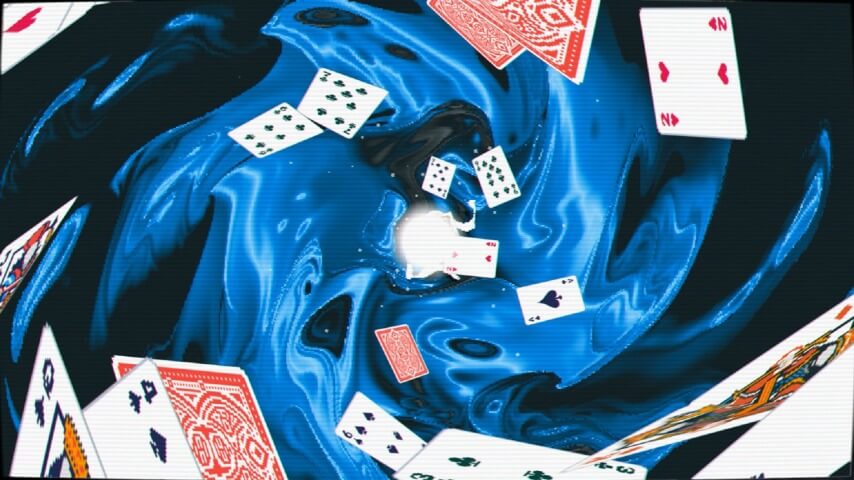I have a certain obligation, as a games critic, to take in as much new media as I can. (Even if the new media is sometimes old media, a feeling that set in extremely quickly when, for example, I spent some time with Tony Hawk Pro Skater 3 + 4 this past week, and felt the crushing weight of time swiftly settling in. You may not be able to cross the same river twice, but you can apparently kickflip over that one Foundry gap again… and again… and again.) What I should absolutely not do, in my effort to keep abreast of a medium I love, is use my precious free time to load up Balatro and play it for a few hours each night with my wife.
Anyway, I’ve been playing a lot of Balatro with my wife lately.
She missed LocalThunk’s 2024 GOTY when it came out last year, being largely agnostic to the currents of PC gaming. Credit, then, to Nintendo’s bizarre game release strategy for its new Switch 2—in which one whole (extremely good, but also extremely singular) game rolls out every month—for pushing me to get her into it. Once you’ve picked up all the Mario Kart stickers and colon-clogging metal bananas you can handle, there’s just not much to do with the new machine except dip into the back catalog—and few games in the (updated, but still slow as hell, right?) eShop draw the attention more boldly than “What if poker was better, and let you cheat?”
I always suspected my wife would like Balatro, because the previous game I’d managed to get her hooked on was The Binding Of Isaac, and those two games—despite sharing no direct aesthetic, narrative, or mechanical hooks—are deeply aligned in their core philosophies. To wit: If you build from a strong, simple foundation of play, there’s really no limit on how stupidly powerful you can allow your players to get, as they revel in the divine power of multiplication. In Isaac, that means a cascading series of upgrades that interact with each other in frequently game-breaking ways; in Balatro, it’s finding the proper combination of rule-changing Jokers, buffs, and chopped-and-screwed card decks to allow truly massive numbers to come pouring out of the machine. Getting a Balatro run to really pop, finding some synergy of tweaks to the ancient rules of poker that causes each hand to turn into a fireworks display of popping bonuses and multipliers, remains one of gaming’s purest pleasures. The visuals and sound all support the fantasy—there’s still nothing quite like seeing your score display catch fire as you blow through the score requirement of your current blind in a single hand—but it’s the play itself that imparts the compulsive pleasure of climbing the tower of More.
As a cooperative exercise, and a way to spend time together on a summer’s evening, it really can’t be beat. Balatro is, essentially, a strategy game with some math bolted onto it, and talking each other through big decisions makes for twisty, highly enjoyable back-and-forths. Is it worth swapping that Joker out for one that will generate a buff in a couple of rounds? Can we risk one more shop reroll? Is it better to push for more powerful hands like Straights, or just buff out High Card until a single played ace can crack the whole system in half? It’s a game of interesting decisions, only made more so by having someone to share them with. (Not that a little competitive aspect doesn’t creep in, too; we switch off who’s got their hands on the controller, and there’s definitely some pride at play at who can land the highest score, or master the game’s increasingly nasty difficulty settings.)
I want to be clear: I’m a big believer in the value of novelty in games. This is still a young medium, and—especially when you get your head out of the AAA clouds and look at indie spaces, where the real work is happening—one that is constantly mutating and evolving. Games writing, thus, is a constant race of curation, because someone is always making something that no one’s ever thought of before, or tweaking existing ideas in novel ways. (LocalThunk hasn’t been shy, for instance, about Balatro‘s influences when talking about the game’s success—which is as good a reminder as any that, if you’ve never tried Luck Be A Landlord, you’re really missing out.) But we also play games to play them, not just to analyze, dissect, or build little shrines. Balatro was a joy when it came out in 2024, and joy has not exactly become more readily available in the year that’s followed. Creating a nightly ritual around it—a few games apiece, some spirited debates, a little shit talking, and a few more cards logged into the collection—helps impose structure onto the sometimes formless time-blob that is modern living. If that means Balatro ends up being my most pleasant, most-played game of the year for two consecutive years, well… There are worse things in this life, yeah?









































